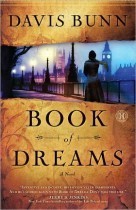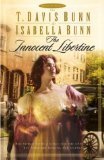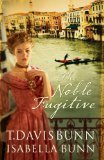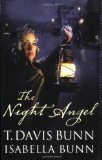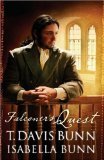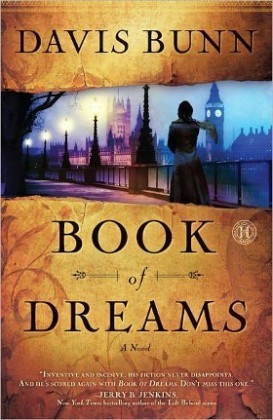Davis Bunn's Blog, page 36
October 7, 2011
A New Novel From a Friend

 My dear friend, Gwen Ford Faulkenberry, has a new book out, Love Finds You in Branson, Missouri
My dear friend, Gwen Ford Faulkenberry, has a new book out, Love Finds You in Branson, Missouri (Summerside Press).
(Summerside Press).
Thought you might like to give it a whirl.






October 6, 2011
You Could Win a Copy of 'Book of Dreams'

I'm taking Book of Dreams on a blog tour to several dozen blogs. Many of these bloggers will be giving away a copy of the novel (released this week from Howard Books/Simon & Schuster) , and I'll be publicizing the giveaway contests on my blog and on my Facebook page.
Today marks the first stop on my blog tour, at "A Christian Writer's World," a popular book review blog by award-winning novelist, Lena Nelson Dooley. You'll find a synopsis of the plot, a link to read Chapter 1 for free, and a Q & A with me. Plus, of course, Lena's giveaway contest. To enter, simply leave a comment on the Book of Dreams post.
To ensure that you get the notifications for all the book giveaway contests that will be happening during October and November, click this link to subscribe to my blog via your feed reader, or to receive my latest posts in your Inbox: http://feeds.feedburner.com/DavisBunn
Good luck, everyone!
Warmly,
Davis






October 5, 2011
Reader Calls 'Heirs of Acadia' Series 'Wonderfully Crafted'


Carolyn writes:
I simply must express my gratitude to you for your Heirs of Acadia series. I just finished the final book of the series, and, once again, wish that Falconer's Quest wasn't the last one.
I just loved John Falconer (especially). You and your wife, Isabella, are certainly are a great writing team! Thank you for the five wonderfully crafted books, the excellent writing, the fascinating detail, the strong spiritual tone (in this series), and characters that won't be easily forgotten.
Dear Carolyn,
Thank you so much for the lovely note. It arrives at a rather bittersweet moment, for we received word that the first in that series was going out of print. It's had a good long run, going on eleven years now, but it is still a bit sad. It's like saying farewell to a dear and beloved friend.
The books are still available on Kindle, thankfully. But still…
I have long thought that I'd like to return to John Falconer at some point. There are several characters who have become intensely close over the years, and Falconer is definitely among this group. Particularly in the last story, when he journeys to the Marseilles of his epoch, and then to North Africa, I really felt like this was a guy I wanted to have keep me company.
Warmly,
Davis and Isabella
**Note: If you'd like to read the Heirs of Acadia series, the books are available from online booksellers and from your local library. Here is a list of all five books in the series, in order:
Book 1: The Solitary Envoy
Book 2: The Innocent Libertine
Book 3: The Noble Fugitive
Book 4: The Night Angel
Book 5: Falconer's Quest






October 3, 2011
'Book of Dreams' a Masterpiece of 'What If,' Says Reviewer

My new novel, Book of Dreams, has just been released by Simon & Schuster/Howard Books. In the coming weeks, I'll be sharing reader reviews of Book of Dreams on my blog. Here is the first reader review I've received.
By Don Courliss
Guest Reviewer
It took me two nights to finish Davis' newest book, Book of Dreams. Not because it hadn't "hooked" me, but because I needed to sleep! In fact, I was definitely hooked by the end of the first page. This book is a masterpiece of "what if."
"What if" you were given an icon that helped raise your awareness of the Presence of God to an amazing height?
"What if" that awareness also included an ability to interpret dreams?
"What if" the dreams were those of very powerful men in the world banking system?
"What if" those men were more interested in pleasing God than man?
"What if" that devotion made them targets of an age old, very resourceful Enemy?
The answer is quite remarkable, intriguing, challenging, frightening and downright entertaining.
To be fair, the only objection I can find is that it seems as if the heroine, as well as those involved with her, rely just a little too much on the icon and not enough on the personal relationship with God.
My rating: Highly recommended.
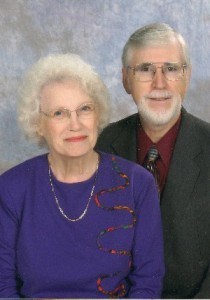 Don Courliss is a retired commercial printer turned model railroad hobbyist. He and his wife, Carol, have been married almost 29 years, and have been involved in ministry for as many years as they've been married. Don is currently teaching a Bible study on the book of Revelation at their church in Tennessee. He and Carol also minister at an assisted living facility in their area; Don teaches a Bible study and Carol plays the piano.
Don Courliss is a retired commercial printer turned model railroad hobbyist. He and his wife, Carol, have been married almost 29 years, and have been involved in ministry for as many years as they've been married. Don is currently teaching a Bible study on the book of Revelation at their church in Tennessee. He and Carol also minister at an assisted living facility in their area; Don teaches a Bible study and Carol plays the piano.
They have accumulated over 500 Christian fiction books in their home library (of which 25 are by Davis Bunn). And yes, they've read them all! Some of them, more than twice.
Disclaimer: Don received a complimentary advance review copy of Book of Dreams from the publisher, Howard Books (a division of Simon & Schuster) in exchange for an honest review.






September 20, 2011
What I Did On My Summer Vacation

A luxury hotel group, the largest and oldest in Switzerland, last year decided to re-instate a writer-in-residence program. They had it for some sixty years, then stopped just before the onset of World War Two.
I was told about it because of my having lived in Switzerland for five years. To my astonishment, I was one of the first half-dozen writers invited to participate. Former visitors include Thomas Mann, Goethe, Hemingway, and Mark Twain! It makes me laugh just to name them, but it's true. We were given five nights in the lovely Hotel Zermatterhof, at the foot of the Matterhorn. It was a spectacular and totally unexpected treat.
At the conclusion of this glorious stay, they asked me to write an article based upon my experiences. I thought you might enjoy seeing what I've had to say:
The Swiss themselves will tell you they're a hard people to know. Many take pride in this fact. It is not difficult to understand why, especially as this trait is shared with other cultures that face a similar problem.
My wife and I were greeted by the same closed-door attitude when we moved to Oxford. On the surface, the two locations could hardly be more different. The Oxford landscape is as flat as a crepe. Beyond the university's confines, the city could hardly be described as orderly. The region produces no wine, and its chocolates are second-rate. The only two issues Oxford holds in common with Switzerland are a ridiculous fixation on local cheese, and this, the trait which grants the Swiss absolution for their attitude: They are both cultures under siege.
More than one-third of all Swiss residents are foreigners. The same is true for Oxford. In both cases, this percentage does not include the hordes of students, tourists, and visiting dignitaries that invade year round. What is more, most of these residents are transients, meaning that they are in the region for a limited time. It was recently estimated that, on average, the entire transient population of Oxford is renewed again every four years. Which explains why newcomers to both regions find themselves repeatedly asked one question every time they meet a local: When are you leaving?
I lived in Switzerland for four years, first as a lecturer in economics at the American College in Canton Vaud, then as Marketing Manager of an international corporation based in Lugano. I learned to speak Italian and German and a smattering of French. I had Swiss friends. But I left Switzerland as I arrived—an outsider.
Following this, I became a consultant based in Dusseldorf. It was during this period that I began writing. I wrote for nine years and completed seven books before my first was published. During this struggle, I had several frustratingly close calls. The last of these was the offer of my first publishing contract, to write a hands-on travelogue of Switzerland.
To make a long story achingly short, the book was written and accepted, at which point the publisher went bankrupt. As I prepared for this trip to Zermatt, my wife came across the manuscript, which I had not seen in years. My last trip to Zermatt was during the formation of that never-published book.
In beginning that ill-fated travelogue, I was faced with a horrible quandary: The problem was not writing about Switzerland. The problem was finding something original, a theme that had not been done a thousand times before, and by far better writers. I carried this dilemma around with me for several months. The answer finally came from the most unexpected of sources.
Throughout this nine-year period of creative trial and struggle, I continued to work as a consultant. My day-job had me traveling to two and sometimes three countries every week. I learned to write in taxis, hotels, planes, waiting rooms, conference halls, and occasionally at my own desk. My goal was to write twenty hours per week. I held to this with the grim conviction that if I let up, even briefly, outside pressures would tempt me to let go of my dream entirely. And it was only now, at this point of having received my first contract, that I found myself unable to write.
One of my consulting projects at the time was with Alusuisse, which was looking to set up a new smelting operation. My contact at the company was a fiercely intelligent Swiss, whose only speed was full bore. After a typically exhaustive nine-hour session, we had paused for the day's only meal. I found myself confessing my current dilemma, having finally received a publishing offer, and having no idea whatsoever to write about.
This steel-hard executive instantly underwent a remarkable transformation, and ordered me to write about hiking the high-altitude glaciers. He almost sang his descriptions of the experience. This discussion continued through the remainder of our meal and carried us back to his office, where he insisted upon calling his closest hiking buddy, one of the directors of Swiss National Tourism.
As I observed him on the phone, I felt as though I had glimpsed something new, not merely in this rather crusty businessman, but in the culture he represented. It was only much later, as I completed the work on this manuscript, that I could name what I first witnessed there in his office.
These two gentlemen, the Alusuisse executive and the tourism director, took me under their collective wing. They mapped out a summer program, where by the end of September I would have traversed at least one major glacier in each of the Swiss alpine regions. Beginning the third week in June, I traveled back to Switzerland each Friday, and spent the weekends literally hiking myself into a sweaty little puddle.
My first glacier, at the order of the tourism boss, was located at the end of the Engadine Valley beyond St Moritz. In Victorian times, this route was known as Smuggler's Pass, for the illicit traffic of goods carried back and forth between Switzerland and Italy.
It was a brutal trip, both because of the terrain and the circumstances. The trek began with a four hour hike just to arrive at the glacier face, then over an hour to scale the moraine rubble, another three hours to cross the glacier itself, and a final hour to reach the mountain hut where we were to overnight.
What was worse, I was part of the first team to arrive at the hut since the host family's daughter had perished by falling into an ice crevasse. The entire Engadine mountain community was in mourning. The somber closeness they felt to the absent parents was wrenching, especially as I watched them lay a wreath on the ice.
My second weekend was to be spent in Zermatt, home to the only glacier stable enough that I could cross alone, without being roped up or in the company of a guide. The tourism boss and my new friend at Alusuisse insisted it was time, as they put it, for me to meet the ice on the ice's terms. Alone. When the power was total, and the ice was my entire world. I still remember that moment, sitting in his fine office and hearing him say those words, and watching the stern Swiss veneer melt away. The rock and the ice and the power and the solitude.
The night of my arrival in Zermatt, I suffered a series of horrible nightmares. The emotions surrounding my experience in the Engadine came surging back. I dreaded going up and meeting the ice alone. In the Engadine I had been roped to my guide, part of a group. Each step had been preceded by carefully testing the ice ahead. Tomorrow I would have none of that safety. Every time I shut my eyes I saw the waiting crevasse, the fall, the wreath. I bitterly regretted agreeing to this insanity. I wished I had never started the project.
I took the Gorner Bahn to the top station, and arrived at the trail soon after the sun crested the surrounding peaks. Walking to the Monte Rosa hut was possible alone and unroped because the glacier was extremely stable. Most glaciers are constantly on the move, which creates deep fissures and highly unstable surface ice. The base of a glacier generally moves faster than the face. As a result, what appears to be a stable sheet of ice is often rotted from beneath. The chasms below can be a quarter of a mile deep. But the Monte Rosa walk was over a very stable ice flow. Or so I was told.
As I stepped onto the ice, I heard the drumming of an approaching helicopter. The chopper descended onto a narrow tongue of earth that jutted like a peninsula into the ice. Soon as the motor died, a family started piling out. Mom, Dad, more kids than I could count, another older couple, and piles and piles of gear.
Only this was not mountaineering equipment. Instead, I watched them pull out frosted wine buckets, a case of champagne, picnic hampers, bottles of lemonade for the kids, a basket that wafted the scent of fresh-baked bread, a bag from the Caviar House, a wooden bucket of butter, and an entire wheel of cheese. Then out came a very old lady on a padded stretcher. The men took hold of the four handles and carted her out onto the ice. As the chopper took off again, I went back and offered to help, mostly because I had to learn what in the world was happening here.
The family walked far enough out to be surrounded by white, and basically pitched camp. They explained that their grandmother was dying with cancer, and her last wish had been to smell the ice once more.
The old lady was there and not there. She smiled whenever someone spoke to her, and had a gentle hand for every child that came within reach. But her attention was really on the ice. I left them to their happy-sad outing, gifted with an answer to a question I had not even dared ask: Why bother? Why even go out there, when there is such huge danger? Why risk a daughter, a family, even an hour of your time?
As I walked further and further into the white-bound world, surrounded by wind and peaks and a blue-black sky, I found myself becoming imbedded in the silence. It was an awesome moment, being enveloped by a force that could kill so easily, and yet held such magnificent beauty. By the time I returned late that afternoon, the chopper had returned and the family was gone. But I thanked the old lady just the same, and wished her well in her onward journey.
Here then is my tiny glimpse into what I feel may be the heart of the Swiss. They go through life overshadowed by nature. It surrounds and isolates them on all sides. Those Swiss who are genuinely happy in their own skin have found a way to meet this power head on. Face to face. The only way such a meeting can happen. Alone.
Those who do this, they return to the hurried rush of modern life with a visceral bond to their true world, a land that was here long before they arrived, and will remain long after they are gone. They have experienced a partial, momentary, imperfect unity. And this small fragment is enough.






September 5, 2011
Reviewer Mark Buzard Gives 'Lion of Babylon' 5 Stars

This review was originally published on Mark's blog, Thoughts of a Sojourner.
Marc Royce works for the State Department on special assignments, most of them rather routine, until two CIA operatives go missing in Iraq–kidnapped by Taliban forces bent on generating chaos in the region. Two others also drop out of sight–a high-placed Iraqi civilian and an American woman providing humanitarian aid. Are the disappearances linked? Rumors circulate in a whirl of misinformation.
Marc must unravel the truth in a covert operation requiring utmost secrecy–from both the Americans and the insurgents. But even more secret than the undercover operation is the underground dialogue taking place between sworn enemies. Will the ultimate Reconciler between ancient enemies, current foes, and fanatical religious factions be heard?
My review:
I have read a few books by Davis Bunn over the years, but that did not prepare me for reading this one. Wow. What a read. I will admit I was a bit worried about the plot – was afraid it would come off very pro-Muslim in the way that the liberal media does, but it did not. Yet it isn't anti-Muslim.
I curled up in my reading chair and planned on reading a chapter or two. I quickly ditched that plan, and settled in for the long haul. I loved the plot, the setting, the characters – especially the main character. There was a lot of suspense and drama, which I love in a book, and above all was the Christian content. This is not simply an awesome international intrigue thriller. It is much more than that. It showed through fiction how God can work – and is working – in any country or people and can bring those people to Him.
Though fiction, Bunn painted a great and realistic picture through his words. As I read through the pages, it was like I was there on the streets of Iraq. The whole book seemed real, like the events could really happen. I got pulled into the book and became a very willing observer of the action and events within. I also learned a lot about Iraq and the difference in the kinds of Muslims.
My only disappointment was coming to the end of the book. It seemed to come too fast. I saw on a sign last week this quote: "The problem with some books, is that the covers are too far apart." True. But the only problem with this book, is that the covers were not far enough apart. I loved, loved, loved this book! I cannot say enough good about it.
I am very much recommending it. It is a story that men are more likely to enjoy than women, but anyone who enjoys a good thriller with international intrigue and military action will enjoy this. It should get 5 out of 5 stars in any review.






August 29, 2011
Three Reviewers Call 'Lion of Babylon' Amazing, Fascinating, Riveting

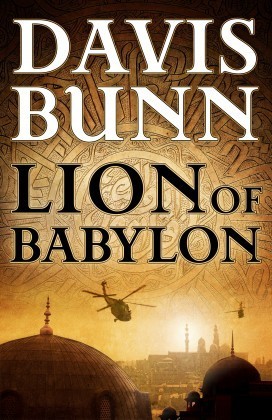 "Davis Bunn's intricately-researched, richly detailed novels amaze me. He's unafraid to peer into the depths of the human condition, yet always finds a way to point us to a truer compass."
"Davis Bunn's intricately-researched, richly detailed novels amaze me. He's unafraid to peer into the depths of the human condition, yet always finds a way to point us to a truer compass."
~Steven James, bestselling author of The Pawn
~~~~~~~~~~~~~~~~~~~~~~~~~~~~~~~~~~~~
With clean and crisp writing Davis Bunn once again delivers a fascinating story with current and ancient history carefully woven into the telling of Lion of Babylon.
That mix of old and new, the clashes of different denominations in the Muslim faith and hierarchy, the politics of people lusting for power, and the bridge between an Iraqi's family and a lonely American give the reader a clearer picture of a people's innate distrust and the conflicts of nation building after its ruination by a dictator. The clever title speaks of both the physical and eternal.
~From the blog, Into the Fire
~~~~~~~~~~~~~~~~~~~~~~~~~~~~~~~~~~~~~~~~~
Bunn is a master at crafting realistic characters and dialogue that capture the reader's heart and attention so they are forced to keep turning the pages. The result is a riveting story where ancient enemies must come together to solve the mysterious disappearances and unravel the truth. A rich tapestry results in suspense mixed with faith-in-action. I'm a fan of Bunn's work but he has done it again with Lion of Babylon. Get a copy of this book.
Rating: +5
~Terry Whalin, author of more than 60 books






August 26, 2011
From the 'Never-a-Dull-Moment' Department

Last October, I was contacted by the senior vice president of sales and marketing at NBC Television, who has been a fan of my work. She is a believer, and has wished for years that there was more TV entertainment with a strong moral base. Instead, it seems to her as though things continue to shift in the opposite direction. She said that if I could put together a project that has serious potential, she would support it through the system.
Inside the major television groups, there is a serious divide between the sales/marketing and the production divisions. Basically the producers consider themselves to be the only people who can determine the worthiness of a project. So for a sales director, no matter how senior, to come forward with a project simply would not fly.
This meant I needed to set up a project in the standard TV fashion, jump through the standard hoops, and the sales vp would do what she could to back this from the sidelines. And that is how all this began.
Scene-by-scene
That same month, I was named Lecturer of Fiction in Oxford's new creative writing program. The head of the screenwriting division is a friend, and we had already been working on a film concept together. Nicholas is the former chief writer on England's longest-running TV crime drama, called 'The Bill'. We discussed various concepts, and decided the Book of Dreams idea could work as a television series.
Together we put together what is known as a scene-by-scene. This is basically an entire screenplay, but without the dialogue. In the television format, the Book of Dreams resembles an Inception-style story that could be done on a television budget.
Something this complex can't be properly summarized in the standard Hollywood two-page format, which is called a leave-behind, because after a verbal pitch you leave the document behind with the producer for them to pass around. Also a scene-by-scene gives the producer a chance to cost out the project. It is one thing for the writer to say, "You can do this on a TV budget." It is another thing entirely to show this on the page. The scene-by-scene ran to twenty-six pages, and was completed in December.
Producers
At this point, friends within the believing community in Hollywood introduced us to two very successful producers. Dave and Gary Johnson have had four long-running TV shows, two of which were aired on NBC. They really liked the concept, and signed on.
Because of their enthusiasm, I got up the nerve to contact the film producer in England I most admire. His name is Norman Stone, and he is considered by many to be the leader of the European believers working in film and television. His most famous work was Shadowlands, but he has done dozens of films. This has included two films starring Peter O'Toole for NBC, which means he is on the group's 'Green List'. This is the list of directors and producers who are considered at such a level of performance that they can bring any project directly to the network's top decision makers. Norman really liked the concept, and signed on to direct.
At this point, everything was put on hold. NBC was acquired by Comcast in late January, and virtually every top decision maker on the content side was replaced. This upheaval continued through the end of April. Which was an extremely good thing, as far as we were concerned, for two reasons.
First, it gave me a chance to focus upon the Unlimited screenplay and then begin writing the sequel to Book of Dreams. And second, it gave Norman Stone the chance to take the project to the BBC.
The British Broadcasting Corporation has been going through a similar upheaval to NBC. And the result has been that they prefer not to cover the full cost of new drama alone. They want international partners. So after weeks of preliminary discussions, the BBC in late June decided they wanted to partner with NBC on Book of Dreams.
At this point, everything becomes a little surreal. I really can't begin to describe just how wild this has been.
It's sort of like saying, "I drove through Manhattan at rush hour at fifty miles an hour."
Those words don't include the flying bags and purses, the faces jammed against the windscreen, the laughter, the screams, the horns, the mayhem, and so forth.
Star Struck
The BBC has offered to cover one-quarter of the total cost of a series, so long as two things happen.
First, they want one major star to be British, and another to be European.
Second, they want to have the right to pre-sell the series to European partners.
So at this point, we suddenly have begun talking about who we would most like to play the various roles. Our first two choices for the lead role, Dr. Elena Burroughs, are Gwynneth Paltrow and Rosamund Pike. It is apparently important to have this sort of image in place before going to the Hollywood decision makers.
Our job at this point was to winnow down the scene-by-scene to four pages that could be agreed on by all the parties involved thus far–Norman Stone, the Johnson Brothers, the BBC, and us the writers.
Pilot Episodes
We then were asked by the BBC to do six pilot episodes that showed a full season arc. Just learning what this sentence meant has taken me the better part of a month. What they wanted was not six episodes back to back, but rather segments from throughout the season that would show an overarching concept, a background issue that would be resolved by the end of season one. And do this in a maximum of four paragraphs per episode. One important lesson every Hollywood writer will tell you is, producers don't read anything longer than a page.
Agent
The neatest part about this exercise – and there have been some really great things involved in this creative process – has been how it has drawn all of us together. By this point, one more person has also been brought into the mix. The Johnson brothers are represented in Hollywood by the former managing director of Creative Artists, the largest talent agency in the world, who has left the group and started his own smaller agency. He too has now signed on, and has taken it upon himself to begin setting up what are called the preliminary pitches. This is when the Johnson brothers go in and talk to the senior directors of content for the network.
To have an agent of this status make the calls is enormous. Or so I'm told. By this point I'm sort of the kid in the candy shop, my eyes glazed over, just not really believing I'm actually involved in all this. The agent has identified three networks as being the ones he wants to approach–NBC, Syfy, and Fox.
Three-dimensional study
Which brings us to this current trip to Los Angeles. In order to make the pitch to the stars, we needed to do a three-dimensional study of all the major roles. And we had to do this in less than three paragraphs per character. We also needed to reveal specific character arcs in the episodes. This work has taken two absolutely fabulous and exhausting eighteen hour days.
To celebrate arriving at the end of this, we were invited by the NBC vice president out for dinner. Before going for dinner, we got a private tour of the NBC Universal back lot. We took her golf cart and went through the stages for all these amazing shows, some film and some TV, with these mammoth posters up on the walls by the main entrances to the stages.
A 'stage' here is basically a warehouse, somewhere around fifty thousand square feet, built out of concrete to completely block all external noise. Two really cool things about that trip. Actually, three.
First, we weren't supposed to stop anywhere, but she parked us by the plane-wreck from War of the Worlds and took my picture.
Second, we had a private tour of their wardrobe warehouse with the division head. They have five million items of clothes in this place, there's a room for jewelry bigger than my house and a second room just for Roman leather uniforms.
Third, after the tour we went back up to the VP's office, and she showed me this massive closet beside the division receptionist that holds all the latest DVDs. She pulls out this drawer and says, Would you like anything? There is this problem I'm facing tonight as I fly back to England called, weight limit. I have filled the hotel room's three trash cans with dvd wrappers.
The pitch sessions are slated to begin in two weeks time. There was a fascinating article in the Wall Street Journal at the beginning of the summer that has really helped keep all this in perspective. Somewhere around a thousand concepts arrive at the point where we are now. Of course, not many will have the backing of a network VP and an offer of co-production from the BBC. But still.
From these several hundred concepts, the three channels we are approaching will produce around thirty pilots. These odds should probably be daunting. But to tell the truth, I have had so much fun it has been possible to simply live in the day. That really has been an achievement in itself. But I feel so intensely blessed by the whole deal. So many wonderful lessons and friendships have been gained. So much laughter. Really. It has been a blast.
Your prayers would certainly be appreciated.
Warmly,
Davis






August 22, 2011
'Lion of Babylon' Reads Like a Hollywood Blockbuster, Says Reviewer

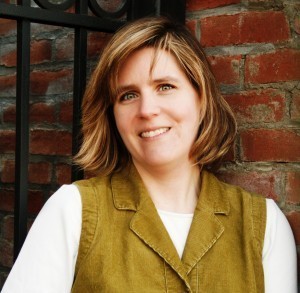 By Karen Barnett
By Karen Barnett
Guest Reviewer
This review was originally published on Karen's blog, Cannot Be Shaken. Reprinted with permission from the author.
Lion of Babylon reads like a Hollywood blockbuster. The story kept me on the edge of my seat from beginning to end. If you need some excitement for your summer travels–look no further.
Here is the basic plot summary, courtesy of Bethany House Publishers:
Marc Royce has been a State Department agent involved in covert operations–that is, until personal issues lead to his dismissal.
When Alex Baird goes missing in war-torn Baghdad, State comes calling again. Alex is a CIA agent–and a close friend of Royce. Three others have also dropped out of sight–a nurse, an aid worker, a wealthy young Iraqi. Are these cases linked? Rumors circulate about a kidnapping conspiracy, yet both American and local officials refuse to pursue it.[image error]
Blocked at every turn, Royce eventually unearths a trail of secret encounters between sworn enemies. What he discovers could transform the course of rivalry and reconciliation throughout the Mideast. As the human and political drama escalates, can one man summon the courage to make a difference?
Davis Bunn is a wildly talented author and his descriptions of people and places are so vivid that I sometimes forget that I am reading a novel. He delves into deep issues in Middle East culture, history and religion in a way that brings the story to life and makes your heart burn for the Iraqi people and their struggles. With a wonderful blend of personal struggle and heroic action scenes, Lion of Babylon is a powerful experience from beginning to end.
Karen Barnett writes about faith, motherhood and writing in her blog, Cannot Be Shaken. An aspiring Christian fiction writer, she lives in Albany, Oregon with her husband and two children. She is published in Guideposts and Ladybug magazines.






August 17, 2011
Writing Mainstream Novels Does Not Require an Author to Leave His Faith Behind

Linda writes:
I just wanted to write and tell you that I have so loved your books in the Acts of Faith series. They are on my favorite-books-of-all-time-shelf. What a blessing they are to me.
Then while at the Christian bookstore I saw Gold of Kings and I purchased it right away. My favorite genre of books is Christian historical fiction and you have not disappointed, until The Black Madonna. I was disappointed in the phrase, "is she your lover" referring to Storm Syrell and Emma. I could not believe that the phrase was in your book. I thought, is this the same author that has written The Centurion's Wife?
It is so hard to find good action/adventure/history fiction that is not filled with trash and filth. There must be hundreds if not thousands of authors willing to include horrible language,
explicit sex scenes and all the rest in their books. Which makes it all the more exciting when you find an author that writes as good as you and is also willing to keep it clean and glorifying to God.
I read in the front of The Black Madonna:
"Bunn has comfortably made the transition to mainstream readers, and his popularity shows no sign of abating."
So that must mean that you have to forgo mentioning a relationship with God by any of your characters, or include things that would not glorify God to be accepted by the mainstream. They have so very many authors to choose from and we have so very few.
I hope and pray that you will still write so that ALL of your readers will be able to continue reading and loving your books.
Dear Linda:
I must thank you for writing such an open and heartfelt note. Sometimes the hardest words to write, at least for me, are where there is such a conflict of positive and negative, things I like and things that distress me. I just want to tell you that you have done a beautiful job at expressing your joy over these stories, and your distress over this one issue.
The most important thing I have to say is, I am very sorry that you found this point distressing. The reason I wrote this as I did was simply that I wanted to portray Raphael as a member of the other world, the realm not occupied by believers, out there where such casual comments are simply part and parcel of daily life. Cold, uncaring, heartless. Everything his affection for Storm gradually rescued him from.
But whatever reason I had for writing that does not excuse the sense of having offended you, and for this I am genuinely sorry.
As for your question, no, moving into the mainstream with some of my books is not as you have said, a departure from faith-based work. Instead, what I try to do with these books is write a book founded upon faith and Scriptural morals, but where the theme is not overtly evangelical.
That is the key issue for me and a growing number of writers and film-makers, how to take our stories of eternal hope and bring them to a world that is moving ever further away from God's voice.
In any case, I do hope you find future works of mine, both those for the mainstream and those directed to the faith world, to hold to the values which clearly form the mainstay of your own life. May they uplift, and inspire, as well as entertain.
Again, thank you so much for writing from the heart.
Warm personal regards,
Davis







